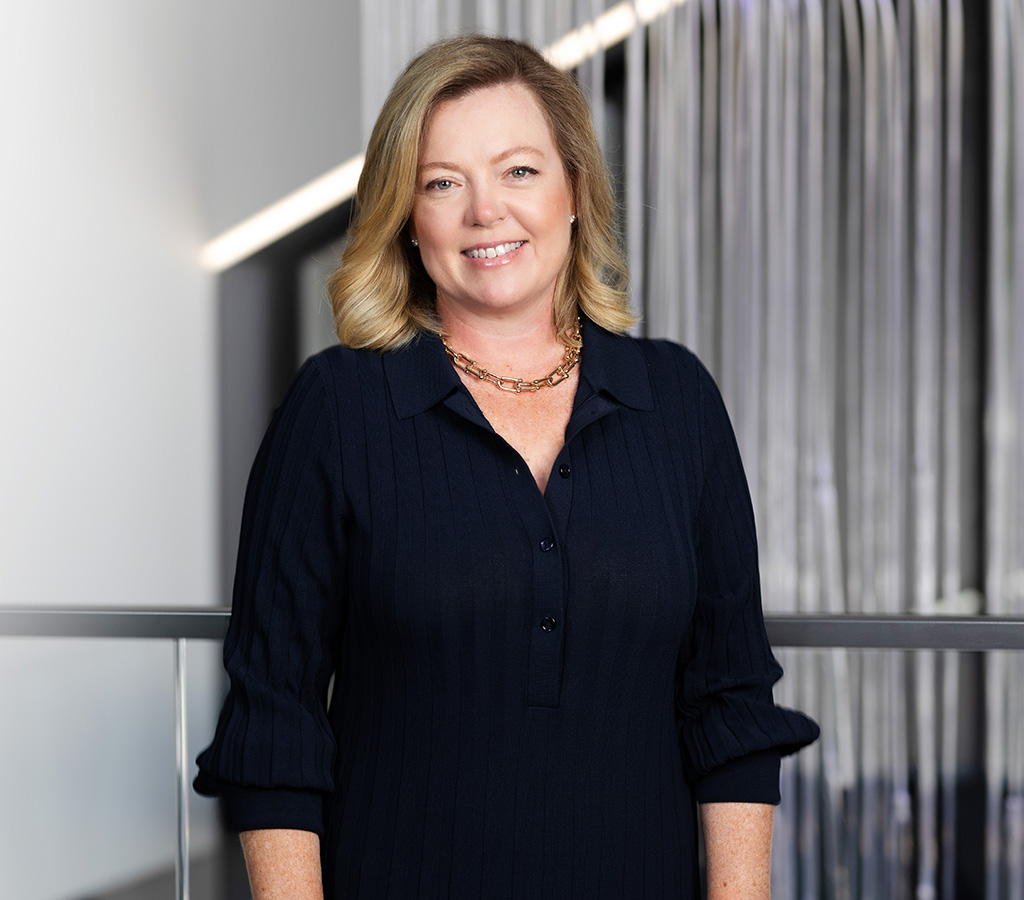Louise Watson was a child of the roaring eighties. Her father worked for high-profile entrepreneur Bob Ansett, the founder of Budget Rent a Car and son of legendary Ansett founder, Reg. “Bob was a big influence in our lives,” she says.
The eighties and early nineties were a volatile time for corporate Australia. The airline pilots’ strike of 1989 shut major airlines and smashed the tourism industry, then the severe recession of the early 1990s.
“They were critical points for our economy,” Watson says. “We were acutely exposed to that. So, these massive shocks in the market that we have been seeing, the GFC and now the pandemic, I feel like I’ve been facing off against those shocks since I was a child.”
Inheriting and harnessing an entrepreneurial spirit
Watson is now Country Head of Australia and New Zealand at Natixis Investment Managers. Globally, Natixis is a giant, managing $US1.4 trillion of funds. But that size is not matched by brand recognition in Australia.
Watson is harnessing the entrepreneurial spirit from her family to help grow the size of the Natixis business in Australia. Driving this is a sense of purpose to serve the local superannuation industry to deliver long-term investment excellence through innovative and sustainable products, particularly in the real assets space.

“My parents were very driven and client focused,” she says. “The tagline for Budget was ‘can do’ and having a can-do attitude for clients. I think that’s part of my DNA and that ties in with what we are doing at Natixis. Our focus is to make Natixis the most client-centric asset and wealth manager in the world and to double our funds under management in the sustainable or impact investing category by 2024.”
“Our focus is to make Natixis the most client-centric asset and wealth manager in the world and to double our funds under management in the sustainable or impact investing category by 2024.”
Watson was born in Brisbane, but then in 1987 Ansett transferred her father to Adelaide, where she completed her education before doing a season as a ski instructor at Beaver Creek, Colorado. Watson wanted a career in business and entrepreneurship, but she was not sure how to make her mark. In the US she realised that she did not have to return to Australia. “The people were fascinating. A lot worked in finance in the US, and I thought: why can’t I start my career here?”
She went for several interviews in San Francisco and, despite competing with graduates from the likes of the elite Stanford University, landed a job at technology-focused investment bank Hambrecht & Quist (H&Q). H&Q was at the heart of the tech boom, working on deals such as Amazon and MP3.com. “It was great being involved in M&A and equity capital markets at that time.”
H&Q was bought by Chase, which subsequently merged with J.P. Morgan. “You just have to keep going and survive all these mergers and keep your seat,” Watson says. Watson transferred to the UK with J.P.Morgan, where she experienced the fallout from the tech bubble bursting.
But her experiences of the wild ride of 1980s corporate Australia stood her in good stead not only for the tech bubble, but the GFC and COVID-19 pandemic later. “I guess it’s been quite useful to have that level of resilience built up over a long period of time.”
Watson eventually moved into funds management, with stints at Credit Suisse and Challenger’s Fidante Partners, where she gained exposure to the multi-affiliate model. “I really liked being in that model,” she says. “You’re able to talk to funds and investors about their whole portfolio.”
Starting out at Natixis
Watson joined Natixis Investment Managers in 2018 to head up institutional distribution. Paris-headquartered Natixis is a subsidiary of the second-largest banking group in France, BPCE, a multi-national financial services conglomerate operating across insurance, corporate and investment banking and asset and wealth management.
Its investment arm, an international multi-affiliate platform, has $US1.4 trillion of funds managed by its twenty affiliate managers including Loomis, Sayles & Company, real estate manager AEW, dedicated sustainable investment specialist Mirova, and a range of alternative asset managers.
Watson says she was chatting with a client recently who described Natixis as “a sleeping giant of the industry” in Australia. “We have $US1.4 trillion in funds under management but not strong brand awareness in Australia,” she says, though she adds that the likes of Loomis have been managing funds for Australian investors for more than two decades. It also owns a majority stake in well-known equities manager Investors Mutual.

“I guess part of the interest in the role is to build brand awareness for a really high-quality investment manager and bring high-quality offshore strategies to Australian investors and make them accessible.”
In Australia, Natixis has $A8 billion of funds under management across private equity, real estate, fixed income and niche equity strategies.
Investment around ESG, SRI and YFYS
One of Natixis’s biggest focuses is ESG (environmental, social and governance) and as mentioned, as a group, it has a target to have over half of its funds in socially responsible investments (SRI) investments by 2024. “So Mirova is a big one for us and that’s where we’ve seen the strongest asset flows in the last twelve months,” Watson says.
When it comes to ESG and SRI, Watson says Australian super funds have made good progress. “What’s moved from just a negative stock screening conversation has moved to a whole-of-portfolio conversation and I think that’s where the critical change has been.”
Another big current focus is helping super funds in the wake of the Your Future, Your Super (YFYS) changes. “Our job is to really listen to our clients and understand what their needs are. Now we need to work with superannuation funds collaboratively to bring them products that are going to help them meet the needs of YFYS.”
Watson says there have been a number of “downstream” consequences of YFYS seen most acutely in the real asset space. Some have criticised YFYS because it does not encourage super funds to invest in real assets such as real estate and infrastructure because returns in the annual test are compared with passive listed indices.
“We want big super to be able to invest alongside each other to invest in critical assets in Australia such as industrial healthcare, cold storage, medical data centres, water and gas assets.”
“We want big super to be able to invest alongside each other to invest in critical assets in Australia such as industrial healthcare, cold storage, medical data centres, water and gas assets.”
Watson says that the Government is now collaborating more with the super industry to work through the downstream consequences of YFYS.
But Natixis is focused on tailoring specific investments for super funds to operate in the YFYS environment. Watson says an example is cold storage. Natixis’ AEW, a Boston-based real estate investment manager, runs a Cold Storage Fund. COVID-19 has triggered a surge in demand for refrigerated spaces, particularly for vaccines.
“In our discussions with super funds, we are discussing cold storage with them as an opportunity to tailor investments to the needs of their members and as an opportunity to invest in critical infrastructure assets which are important for their future retirement outcomes,” Watson says.
Watson says that when it comes to YFYS, performance is one element but not the full puzzle. “Obviously, fees a
re very important for that cohort of investors, but also things like flexibility and the ability to tailor investments and partner over the long term.”
The role of advice and the need for exposures to real assets
Natixis recently released its Global Retirement Index 2021, which ranks countries on four criteria: health, quality of life, finances in retirement and material wellbeing. Australia maintained seventh position overall with a 76 per cent score. (Top-ranked Iceland scored 83 per cent.) In the ‘finances in retirement’ sub-index, Australia slipped one place to fourth, beaten by Singapore, Switzerland and New Zealand. Its score fell from 77 per cent to 74 per cent, with poorer performances in bank non-performing loans, tax pressures and government indebtedness.
Overall, the report, which surveyed investors with median investment savings of $US250,000, found that despite this affluence many are worried about a secure retirement. Some 40 per cent believe “it will take a miracle” to have a secure retirement; 42 per cent worry it will not be an option; and 45 per cent are so concerned they avoid thinking about it.
Watson says this highlights the vital role of advice and the need for exposures to real assets which are sustainably managed. “One of the things that we draw from that is that you still need to have good advice throughout your retirement journey, both while you are accumulating or actively contributing to your super and after you retire,” she says. “You need advice to make sure that you are getting the exposures you need in your portfolio to deliver those goals in retirement. Specifically, we would advocate that you should have a long-term view and include dedicated ESG strategies as well as real assets for diversification.”
“…you still need to have good advice throughout your retirement journey, both while you are accumulating or actively contributing to your super and after you retire.”

Photography by Jeremy Veitch.
The power of connection and mental fitness
Despite juggling a family and a high-powered career, Watson says she does not think in terms of work-life balance. “It’s now about getting the best out of my day for all the people I interact with. That is my kids, my husband, my family, my clients and my team.”
That means a strong focus on mental fitness and mental health. “If you talk to my team, the biggest focus now is mental fitness and empathy. We are in an extended period of lockdown; we’re interacting in isolation. It is really challenging to work together as a team when you are not seeing each other all the time. A huge focus for us is putting a framework in place to ensure that people can perform at their best in a challenged environment.”
Mental fitness means making time for yourself, Watson adds, particularly people working at home with young children. Watson herself is running or walking every day. “I’m a bit obsessed with my step counter. It really lifts me and puts me in the right frame of mind for the rest of the day.”
Watson says she received a good tip recently: how do bring yourself out of the state of ‘meh’ or languishing? “It’s about having a few things that bring you out of meh. For me it is walking. It might be cooking a great meal or having a nice bottle of wine. But I think having those strategies to really bring you out of meh has really helped my mental fitness.”
That mental fitness and resilience—forged in the heady and volatile days of the 1980s and early 1990s—is allowing Watson to thrive during the COVID challenges and to also work towards meeting Natixis’ goals in Australia. “At Natixis we have the right strategies, the right team, and the right framework in place to sustainably and significantly grow our business over the coming years.”




































